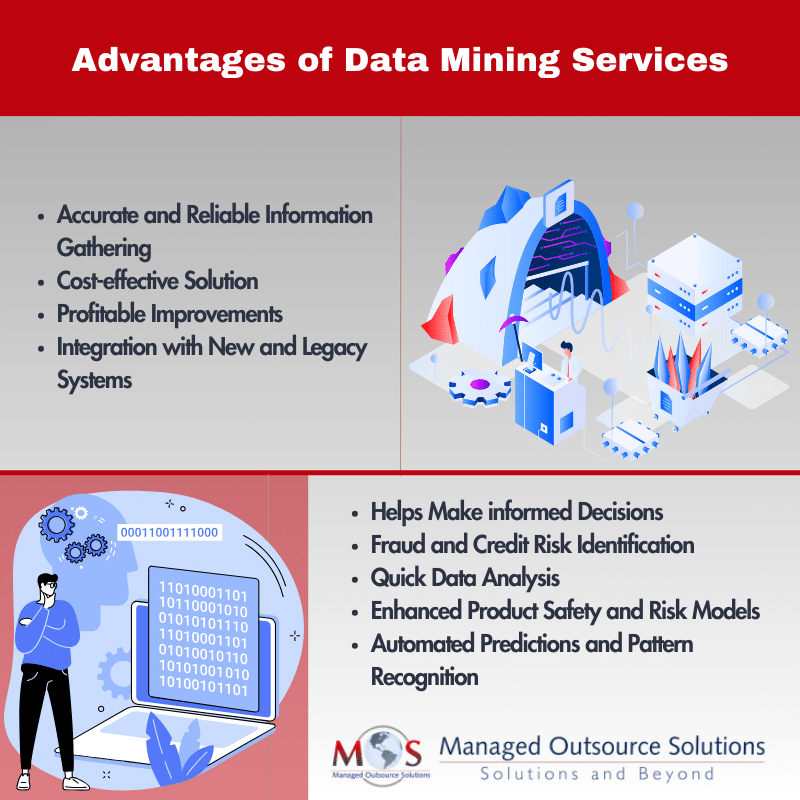Businesses are increasingly using data mining services to realize the full potential of their data in the modern world. These services provide deep insights and support in making wise decisions that promote efficiency and growth.
Businesses have vast amounts of data regarding their customers, their acquisitions, and their operations. This data, which is expected to expand rapidly over time, won’t mean much to you unless you can draw conclusions from it. You can sort through this data, examine it in detail, and find patterns and new trends that you may profit from with the aid of data mining.
What Do You Mean by Data Mining?
The process of looking through and evaluating big data sets to find relevant patterns and trends is known as data mining. It is utilized by different businesses, with data being mined for market research, fraud detection, and credit risk management. The data mined is used to gain actionable knowledge by utilizing complex algorithms and statistical models. This insightful information helps keep businesses competitive.
The data mining process involves several key steps:
- Data Collection and Loading: Data is collected from various sources and loaded into data warehouses, either on-site or through cloud services. This vast amount of information serves as the foundation for subsequent analysis.
- Data Access: Business analysts, management teams, and IT professionals access the data to determine the best ways to organize it. This step is crucial for ensuring that the data is structured in a manner that facilitates efficient analysis.
- Data Sorting: Custom application software is employed to sort and organize the data. This step involves cleaning the data to remove any inconsistencies and ensure that it is ready for analysis.
- Data Presentation: The organized data is then presented in an easy-to-share format, such as graphs, tables, or dashboards. This makes it accessible and understandable to stakeholders, enabling them to make informed decisions based on the insights derived from the data.
Benefits of Data Mining
- Accurate and Reliable Information Gathering: Data mining assists businesses in obtaining accurate and trustworthy information. This is essential for formulating sensible choices and winning plans of action.
- Cost-effective Solution: Data mining is a cost-effective and efficient solution when compared to other data applications. It minimizes the need for new investments by utilizing the data and technologies that are already in place.
- Profitable Improvements: Businesses can make profitable changes to their operations and production by examining trends and patterns. This may result in higher returns on investment and better efficiency.
- Integration with New and Legacy Systems: Data mining can be used with both new and legacy systems, enabling companies to integrate new technologies while optimizing the value of their current data infrastructure.
- Making Informed Decisions: One of the most important uses of data mining is that it offers in-depth insights into several company aspects. This helps leaders make sound choices that lead to business success.
- Fraud and Credit Risk Identification: Data mining plays a key role in identifying fraudulent activity and credit problems. Businesses can detect and reduce such hazards early on by examining transaction trends and habits.
- Quick Data Analysis: Data scientists can swiftly evaluate massive amounts of data by using data mining. In this fast-paced world, where prompt insights can give an advantage over competitors, speed is crucial.
- Enhanced Product Safety and Risk Models: Robust risk models and improved product safety can be ensured with the help of data mining information. This is especially helpful in sectors where safety and risk management are crucial, like finance and healthcare.
- Automated Predictions and Pattern Recognition: Data mining makes it possible to automatically predict trends and behaviors, which aids companies in foreseeing future events. It also has the ability to uncover hidden patterns that conventional analytical techniques may miss.
Modern firms can acquire information about their consumers, products, manufacturing lines, staff, and storefronts. Data mining connects data with useful insights. It helps maximize business value and maintain a competitive advantage over rivals by utilizing increasingly sophisticated algorithms and processes. However, the output and efficacy of data mining are highly dependent on data quality.
Different Data Mining Methods Used for Better Accuracy
The compilation of data, analysis of the findings, and implementation of operational plans based on data mining findings are the process’s ultimate objectives. Businesses can use data mining services to make well-informed decisions that spur innovation and growth, giving them a competitive edge in their respective markets.
To discuss your data mining needs and take the next step towards data-driven success.





